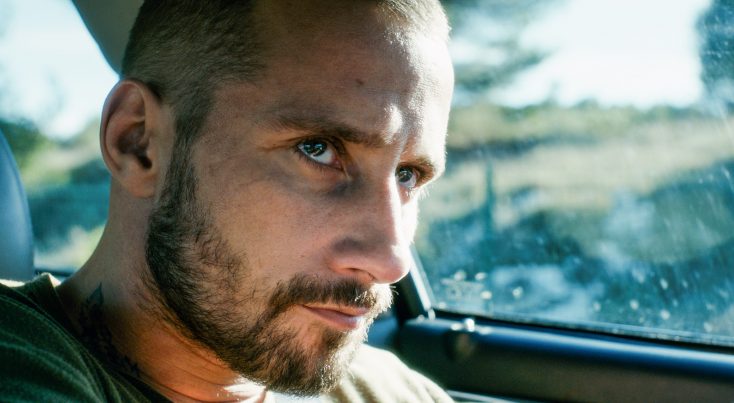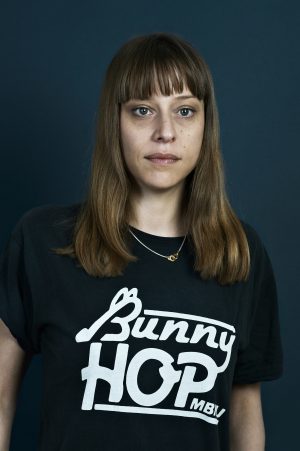By ANGELA DAWSON
Front Row Features
HOLLYWOOD—Rising French filmmaker Alice Winocour was deep into editing her second feature, “Disorder,” when she emerged from the studio one night to discover armed soldiers on the Paris street following the deadly bombing of the Charlie Hebdo magazine offices last year.
“I stood there in disbelief,” recalls Winocour by phone from New York, where she is promoting her film about a French Special Forces soldier suffering the effects of post-traumatic stress disorder. “What’s frightening to me is how quickly we get used to this.”
The psychological thriller/romantic drama, in limited theatrical release and available on VOD, stars Matthias Schoenaerts (“Bullhead,” “Rust and Bone”) and Diane Kruger (“Troy,” “Inglourious Basterds”). Schoenaerts plays a French Special Forces soldier who is home on leave following a harrowing tour in Afghanistan. He is suffering from the effects of PTSD, but is trying to wean himself off his medication. As he awaits his next deployment, he accepts an offer to serve as a security guard at a high-powered businessman’s home. Following the gig, he is asked to stay on a couple more days to watch over the man’s wife and young son, which he does. Soon, Vincent starts to suspect someone is trying to break into the large estate and harm his charges, but he doesn’t known whether it’s real or his imagination. Kruger plays Jessie, the beautiful “trophy wife” of the businessman, who may be involved in some dangerous criminal activities.
Winocour says she wrote the suspense drama with Schoenaerts in mind, after seeing his impressive work in his previous films. She also says she believed Kruger could play a woman who realizes that she’s sacrificed something of herself in order to achieve her status.
Having previously helmed the 2012 French period drama “Augustine,” and co-wrote the acclaimed coming-of-age drama “Mustang,” Winocour spoke about exploring PTSD through this intimate film project, casting the film and what’s ahead.
Q: What inspired this story?
Winocour: I heard that French soldiers were coming back from Afghanistan with PTSD. I went to the hospital to meet them and I was really moved by their stories. They were having nightmares and outbursts of violence and other PTSD symptoms. That’s how I imagined the character of Vincent, who had to face a world of corrupt politicians. He never knew if there was an actual threat around the house or simply a product of his paranoia.
Q: Vincent is aware there’s something wrong with his mind but he can’t distinguish between what’s real and what he is imagining, not knowing what is real and isn’t real.
Winocour: Exactly. And I wanted the audience to be in the same state not knowing what was real and what was not, and to be in (Vincent’s) head, and to only see what he could see and to only understand what he could understand and only hear what he heard. It’s really a single POV (film). The whole film, from the writing process to the shooting to the editing and mixing, I was obsessed with this idea. To be in his head with the music and stuff.
Q: This film has very little dialogue. There are a lot of silent moments with just the security cameras following the characters and Vincent watching Jessie on the monitors.
Winocour: I wanted to be close to him. I think I’m obsessed with dysfunctional people. And PTSD is not about words because it’s beyond language. There are no words to express this trauma. When you have PTSD, you don’t feel part of humanity anymore, so words are not useful.
I met a lot of soldiers and I became close with one of them. He gave me a lot of insight into the impressions he got, after coming back from the combat zone. He said he only could connect with animals. You can see Vincent becomes very close to the family’s dog. It’s because he’s like an animal. In the beginning, he’s completely lost and as it ends, he’s back in the human world. That’s also because of Jessie. To me, this film also is a love story. It’s a strange love story, but still.
Q: You cleverly leave it up to the viewer to interpret the ending.
Winocour: Exactly, but some people told me that it could be a dream. I hadn’t thought of that while writing the script. I thought about double meanings. I was playing with the rules of home invasion movies. You expect things like danger, and then it doesn’t happen and then when you don’t expect it, it’s there.
In more classical storytelling, the dog would have been found dead in the garden. But then, I thought it would be more frightening if the dog simply disappears. As a viewer, you wonder if it’s dead or if it was a fantasy of his all along. It’s because of this that the political story within remains shady. You don’t know if something sinister is really happening or not.
With all the terrorist attacks going on in the world, you feel as though you’re in a bad dream. You have this feeling of paranoia. It’s even scarier when you don’t understand anything. With this constant flow of information and the frightening images that you see, you feel it in the room. And it’s this fear that is really central in the film.
Q: You filmed this before the attacks in Paris and Nice, and yet it speaks so much to the fear of terrorism that now grips France.
Winocour: That’s what’s really weird to me because I was in the editing room when the Charlie Hebdo (newspaper office) attack happened.
The film was shot in the French Riviera. The house where we shot was five minutes away from Nice where that awful attack happened (earlier this year). We show people bursting in the house with guns, and it was simply fantasy. Unfortunately, now we can see it in a very different way: there is just violence and you have to protect yourself.
Q: With so few characters in this, you really had to cast it well. How did you come to cast Diane Kruger and Matthias Schoenaerts?
Winocour: I wrote the film for Matthias. I met several times during the writing process. I had seen him in “Bullhead” and “Rust and Bone,” and I was fascinated by his humanity. I knew he could play this traumatized soul. We were able to see in his eyes that this character had something truly broken. We worked on his body. Vincent has a lot of tattoos and none of them are true—the dates on his arms and the prayer that’s written on his chest. We figured it out together.
And Diane, she plays this cool Tippi Hedren-type wife but at the same time she’s very emotional. Her character, Jessie, is stuck in a golden prison. She’s lost herself in a superficial life that she doesn’t fit into. She’s not really like the woman she pretends to be. At the end, you can understand that she is going to live another life because of this strange love story that awakens her.
Q: The viewer don’t discover Jessie’s name until about an hour into the film. In Vincent’s eyes, she’s simply the person he’s guarding.
Winocour: Exactly. And that was very hard because during filming, we didn’t have rehearsals but I wanted to shoot in continuity. It was a little frustrating because from the beginning, she’s only somebody you see from a distance.
Q: Were there directors or films that influenced you in writing and filming “Disorder?”
Winocour: I had many influences and different ones. There was one funny review we got when the film was released in the UK where the critic described it as “‘Transformers’ if it were directed by (the famed Belgian filmmaker) Chantal Akerman.” Of course, it was a big compliment to me. (She laughs.)
I also was inspired by a lot of home invasion movies such as David Fincher’s “Panic Room” and John Carpenter movies and (Michelangelo) Antonioni’s “La Notte” and “Blow Up,” where you have this character as an observer. I also was inspired by “(Francis Ford Coppola’s) “The Conversation,” and so many of those films where you see the story through a single point of view.
Q: What are you working on next?
Winocour: I’m writing a film about a female astronaut. But I’m also very open to different kinds of films. I have to have an intimate connection to the subject and the folks I direct.
Q: Will that film be set in space or on Earth?
Winocour: On Earth. It’s really about the preparation of astronauts because most of their life, they’re on earth. They only spend one percent of their life in space. So it’s more on their preparation. A few weeks ago I was in Kazakhstan to watch a (rocket) launch, because we’re going to shoot a launch in the film. So being in that atmosphere was pretty fascinating. So I’m finishing the writing now and hope to shoot it next year.
Q: Maybe you’ll cast Diane Kruger in that?
Winocour: No, because the actress has to be French. But I’d love to work again with her.





